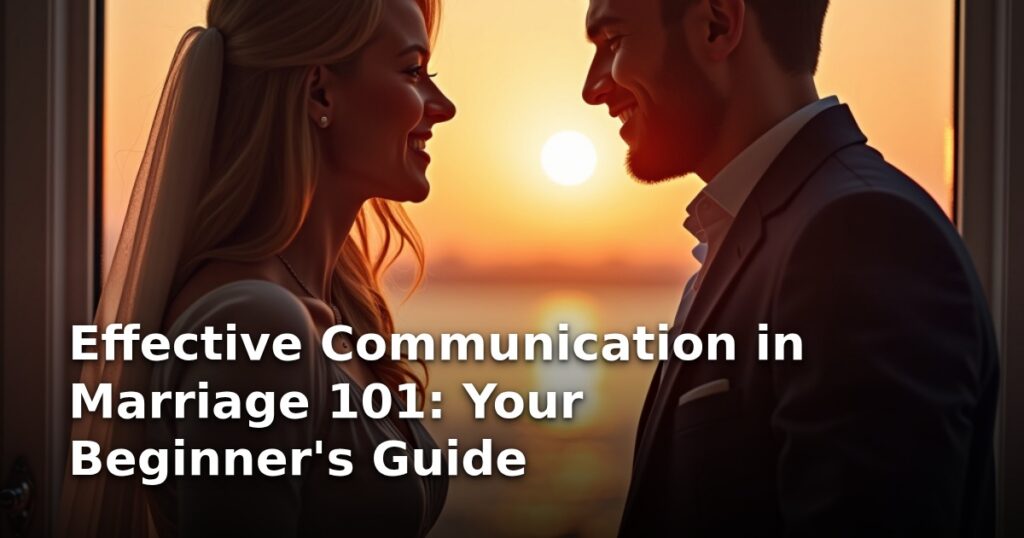Effective Communication in Marriage 101: Your Beginner's Guide
Welcome to the foundational journey of strengthening your partnership! If you are looking to build a more resilient and fulfilling connection with your spouse, learning about effective communication in marriage is the single most important step you can take. This guide is designed specifically for those who are just starting out—whether you’ve been married for six months or twenty years and feel like you’re speaking different languages. We will break down complex ideas into simple, actionable steps, ensuring that by the end of this article, you have a clear roadmap for improving how you and your partner connect.
What is Effective Communication in Marriage? (The Basics)
Simply put, effective communication in marriage is the ability for both partners to share their thoughts, feelings, needs, and concerns clearly, and, just as importantly, to truly hear and understand the other person without defensiveness. It’s not just about talking; it’s about connecting. Think of it like a well-maintained bridge between two islands (you and your spouse). A strong bridge allows for smooth, reliable traffic flow in both directions, even when the weather is rough.
Poor communication, conversely, is like having a bridge with missing planks—messages get lost, misunderstandings pile up, and eventually, the connection becomes hazardous or breaks down entirely. This guide will show you how to start reinforcing that bridge, one plank at a time.
Why This Matters for Beginners
Why focus on communication right now? Because strong communication acts as the immune system for your relationship. It helps you navigate inevitable challenges, from minor disagreements to major life events.
For beginners, mastering these skills early prevents small issues from becoming giant problems later. For example, learning how to discuss finances clearly now prevents arguments when tax season arrives. Furthermore, solid communication skills are crucial when life gets busy. If you are looking for dating advice for the new year, remember that nurturing your existing connection is just as important as planning new dates; communication ensures those dates are meaningful.
Benefits You Will See Immediately
- Reduced Conflict: You argue less about what was said and more about the actual issue.
- Deeper Trust: When you feel truly heard, you trust your partner more deeply.
- Better Problem Solving: You become a united team facing external challenges, rather than two individuals fighting each other. This is especially helpful when considering holiday relationship advice, as the stress of celebrations often exposes underlying communication gaps.
Essential Terminology Explained

Before we move to action steps, let’s clarify a few terms you will hear often in relationship discussions. Don't worry; these are simple concepts!
1. Active Listening
This is more than just staying quiet while your spouse talks. Active listening means fully concentrating on what is being said, both verbally and non-verbally (body language).
- Example: Instead of planning your rebuttal, you nod, maintain eye contact, and summarize what you heard: "So, what I hear you saying is that you feel overwhelmed when I don't help with the dishes immediately after dinner?"
2. "I" Statements
This is a powerful tool for expressing feelings without blaming your partner. "I" statements focus on your experience rather than their behavior.
- The Wrong Way (Blaming): "You never listen to me." (This invites defensiveness.)
- The Right Way ("I" Statement): "I feel unheard when I’m explaining something and you look at your phone."
3. Validation
Validation does not mean you agree with your partner; it means you acknowledge that their feelings are real and understandable to them. It calms emotional storms.
- Example: If your partner is angry about a perceived slight from a family member, you might say, "I can see why that comment made you feel disrespected; that sounds really frustrating." This is particularly useful when managing in-law relationship stress.

Getting Started: Your First Steps to Better Communication
You don't need a massive overhaul to begin. Start small, focus on consistency, and build momentum.
Step 1: Schedule Connection Time (The 10-Minute Check-In)
If you wait until you have a free moment to talk, you’ll never talk. Dedicate 10 minutes every day—perhaps after the kids are in bed or before work—where phones are put away. This time is solely for checking in.
- Rule: No problem-solving allowed in the first five minutes. Just share your day, your feelings, and listen actively to theirs. This consistency is key to staying connected during stressful work periods.
Step 2: Practice the Gentle Start-Up
How you begin a difficult conversation often determines how it ends. If you start with criticism or anger (a "hard start-up"), your partner will immediately shut down. Use your new "I" statements to start gently.
- Try this formula: "I feel [emotion] when [situation happens], and I need [positive request]."
Step 3: Put Down the Device and Look
Non-verbal communication accounts for a huge percentage of what is understood. When your partner is speaking, stop what you are doing, turn towards them, and give them your full visual attention. This simple physical act communicates profound respect.

Step 4: Master the Pause
If you feel your heart rate rising or you are about to say something defensive or hurtful, call a time-out. Say, "I need a 15-minute break to calm down so I can discuss this productively." Use that time to breathe, not to rehearse your next argument. Returning to the conversation later, when you are regulated, ensures better outcomes.
Common Beginner Mistakes to Avoid
Even with the best intentions, beginners often stumble. Recognizing these pitfalls early will save you heartache.
- Mistake 1: Assuming You Know What They Mean. Never assume intent. If something is unclear, ask a clarifying question: "Can you tell me more about that?" or "What are you hoping will happen next?"
- Mistake 2: Bringing Up Past Grievances (Kitchen Sinking). When discussing Issue A (e.g., chores), do not suddenly bring up Issue Z from six months ago (e.g., that vacation disagreement). Stick to the current topic to maintain focus.
- Mistake 3: Trying to Fix It Immediately. Sometimes, your partner just needs to vent, not receive a solution. Before offering advice, always ask: "Are you looking for advice right now, or do you just need me to listen?"
Next Steps for Continued Growth
Congratulations on mastering the basics! Communication is a skill that requires lifelong practice. Once you feel comfortable with active listening and "I" statements, here are ways to deepen your practice:
- Read Deeper Resources: Look into books focused on couples communication, such as those by John Gottman, who pioneered research on relationship stability.
- Schedule Regular State-of-the-Union Meetings: Move beyond the 10-minute check-in to a planned, monthly, hour-long discussion about the relationship's health, goals, and appreciation for one another.
- Seek Professional Guidance: If you find yourselves stuck in negative cycles, a marriage counselor or therapist can provide an objective third party to help you implement these tools effectively, especially when navigating complex issues like extended family dynamics or managing in-law relationship stress.
Conclusion: Building Your Communication Foundation
Learning effective communication in marriage is not about achieving perfect harmony; it’s about building a robust framework for handling inevitable disharmony with respect and love. By committing to active listening, using "I" statements, and scheduling dedicated time to connect, you are investing directly in the long-term success and happiness of your partnership. Start small today. Every clear conversation, every validated feeling, is a brick laid in the foundation of a stronger, more connected marriage. You have the tools; now, go build something wonderful together.



